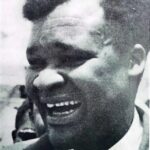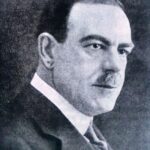AMADU BAMBA
- 3 Min Read
Amadu Bamba (c.1850-1927) is the founder of the Muslim Brotherhood of the Mourods of Senegal. He was a marabout (from Murabit in Arabic), which means a Muslim renowned for his holiness and knowledge. His tomb, in the Great Mosque of Tousa (Senegal), is highly venerated, and there is a yearly pilgrimage (maalgal) to it.

PHOTO CAPTION: Amadu Bamba. SOURCE: EA Library
His Arabic name was Muhammad, while his surname was Mbake. He was the son of a famous cadi, Momar Anta-Sali, and was related to the ruling families of his time. The colonial administration, disturbed by his influence, deported him to Gabon (1895-1902), transferred him to Mauritania (1903-1907), and put him under house arrest at Thien (1907-1912). He finally died at Diourbel on 19th July 1927.
Amadu Bamba had an Arabic Education. He left behind a score of pamphlets, twenty thousand lines in all, on religious topics. He comes out first as a mystic, and a disciple of the famous Moor scholar Chiekh Sidiya, master of the Zawiya de Bou-tilimit, of cadiri obedience. In 1912, he undoubtedly chose a special form of litany (wird; dhikr) to be recited twice a day. He insisted on orthodoxy, the worship of God, the difference between the Revelation of the Prophet and the Inspiration of the Holy One, the necessity for the worshipper to submit to his spiritual guidance, to his shaykh.
Amadu Bamba was fond of repeating “work is part of religion”, and this agrees with at least three hadith of Prophet Mohammed (of which this one: “working so that your own people may live in as much as prayer and the worship of God”).
He thus directed most of his followers to the cultivation of the land. Since the abolition of slavery and the attempts to extract edible oil (1840-48), the native manpower has been orientated, in Senegal, towards the production of groundnuts. The Mouride Brotherhood of Amadu Bamba became the main producers of groundnuts in Senegal. It had about 400,000 male adults; together with women and children, about a million people in all, which is about a third of Senegal’s total population.
It was mainly founded on the ethnic group of Woloffs, and the cultivation villages (daara) were mostly concentrated in Baal, Sine-Saloum, Thiès district, and around Louga. The Brotherhood was highly stratified. It had been reproached for exhausting the soil, for hasty deforestation, for driving away the nomads, and for financially exploiting its followers (taalibe). Others praise its mobilisation of the masses, its impressive solidarity, and the “builders of cathedrals”.
VINCENT MONTEIL




